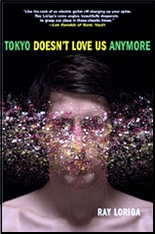Sun 12 Feb 2023
Reviewed by Tony Baer: RAY LORIGA – Tokyo Doesn’t Love Us Anymore.
Posted by Steve under Reviews[2] Comments
RAY LORIGA – Tokyo Doesn’t Love Us Anymore. Translated by John King. Grove Press, softcover, 2004. First published in Spain, 1999.
Futuristic tale about a drug company rep who sells pills that erase memories. Long term or short term. Want to get over grief? Erase the memory that the person ever existed. Want to get rid of trauma? Eliminate the traumatic memory. Want to be happy? Take out all the sad.

The book starts with the salesman in Arizona. He’s very good at his work. But he starts to use his own stuff. He has his own tragic memories he can’t handle. And soon he can’t remember anymore.
Each day becomes the same. He cannot remember his parents’ names. Is he married? Is she alive?
He’s transferred to Thailand. But he can’t stop using.
And as the book progresses, the salesman’s memory continues to deteriorate until he can no longer function.
And the narrative itself, fairly straightforward to begin with, starts to become repetitive and confused, as the text and the salesman’s mind deteriorate together.
It’s a similar theme to Eternal Sunshine of the Spotless Mind. But where the protagonist there decides that keeping a tragic memory of love is still better than nothingness — this book shows what would have happened had the character proceeded with the severance of a memory of a failed relationship that served as a core particle of one’s soul. The soul can no longer hold.
Aside from the story and execution being compelling, the author’s use of simile is as good as anything I’ve read since Raymond Chandler:
‘It leaves you like a Christ held up by only one nail.’
‘When she undresses next to me I feel like someone who goes into a ruined church to pray.’
‘I suppose it’s easier for these people, these poor brutes who work as heavies in bars, to headbutt you than not to. Just as it was easier for Hitler to invade Poland than to play the viola.’
‘Happy lines that spread like the milk from a glass that’s been knocked over across an oilcloth table covering.’
‘She says that probably it’s just men who leave their bodies at death, while women remain fastened to theirs like sunken ships at the bottom of a river.’
‘I dress slowly looking at my own clothes with the surprise of someone who attempts to set up a video recorder following the instructions for a washing machine.’
‘Life is a process of acceleration….. Hours for a child are eternal. Hours for a man, on the other hand, fall down from the sky like rain and there’s nothing you can do to stop them.’
It’s a good book. It’s not as revolutionary as the blurbs on the cover insinuate. But it’s good. Don’t kill yourself trying to get ahold of it. But if you like Eternal Sunshine of the Spotless Mind and Philip K. Dick, it’s worth checking out.
February 12th, 2023 at 11:49 pm
Been debating this one for a while. A little too dystopian emotionally for me, but a good review weighs in its favor.
February 13th, 2023 at 10:55 pm
I can’t say all of the quotes are as good as Chandler’s, Tony, but some come awfully close. (And between you and me, one or two may be even better than some of his.)